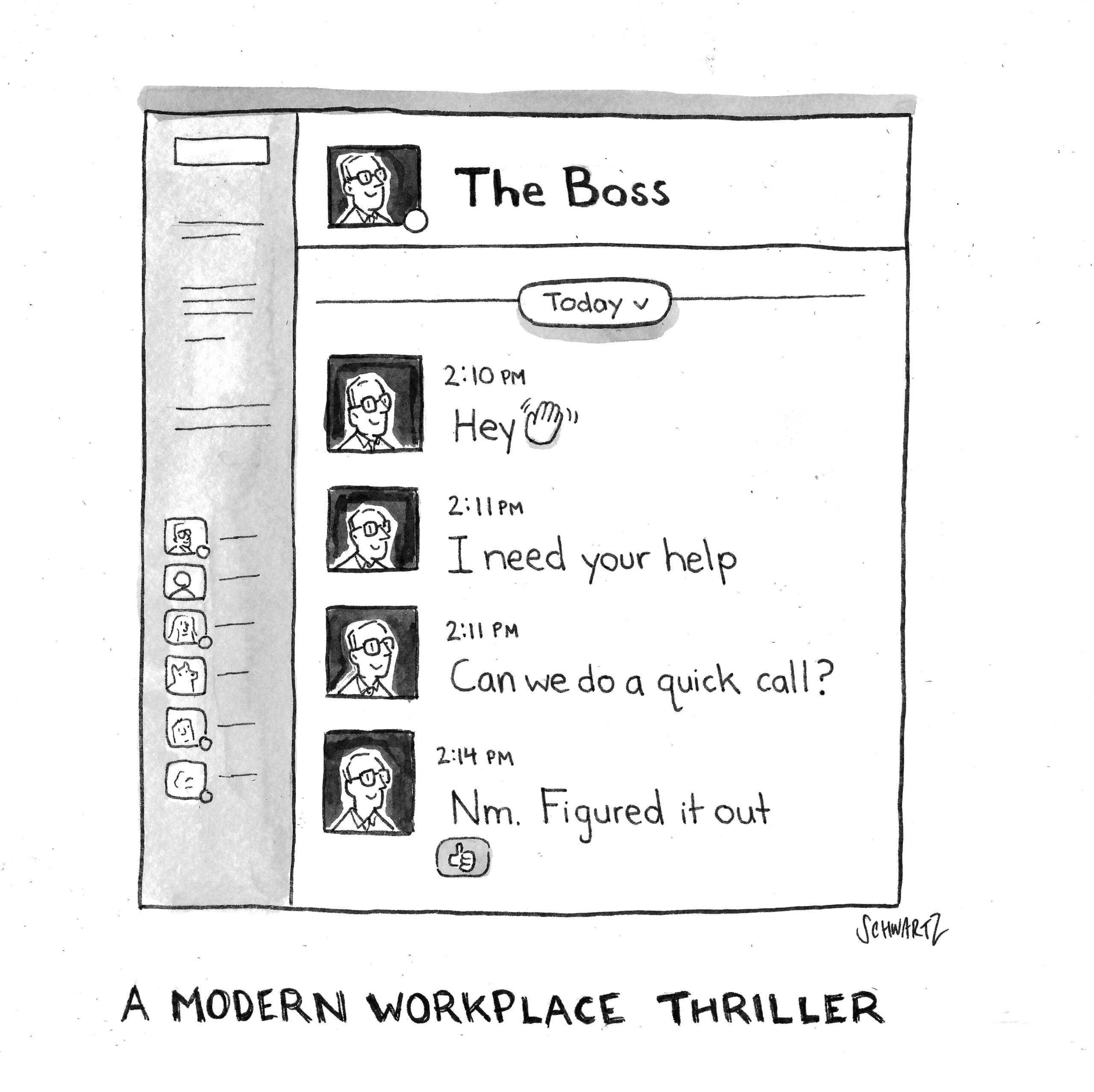Workplace trends
Magnificent 7 stocks are dominating the markets
Dubbed the Magnificent Seven, Amazon, Apple, Google parent Alphabet, Microsoft, Nvidia, Meta, and Tesla undoubtedly lived up to their name in 2023. According to a new report by Deutsche Bank, the profits at these seven tech giants are officially higher than the profits of all publicly traded companies in nearly every G20 country – the world’s major economies. Analysts noted that the combined market cap of the Magnificent Seven alone would make it the second-largest country stock exchange in the world. In fact, Microsoft and Apple, individually have similar market caps to all of the combined listed companies in France, Saudi Arabia, and the U.K. Some analysts warn that this significant concentration poses some risk in global stock markets and may signal an overly optimistic outlook of economic conditions.
For most U.S. millennials, work-life balance matters more than pay
American millennials seem to be stepping away from the constant hustle of career advancement and more willing to accept the potential sacrifices that come with prioritizing their own well-being. In fact, in Ford’s 2024 trends survey, roughly 60% of surveyed millennials in the U.S. said they would take a 20% pay cut for a better work-life balance – the highest percentage of any generational cohort. Experts say these survey results aren’t all that surprising, with other research, including a 2023 King’s College London study, finding that millennials care more about work-life balance than other generations. While it’s not entirely clear why millennials seem to place greater value here than other demographics, it is evident that to effectively retain them, leaders need to invest in making work meaningful and actively supporting employee well-being.
The AI corner
China’s tech firms are relying too heavily on U.S. systems
As China races to develop powerful generative AI technology, the country has found itself lagging behind the U.S. by at least a year due to Chinese companies’ heavy reliance on U.S. underlying systems. This shift has fueled deeper questions about the country’s innovation model. Tech industry insiders and leading engineers say that this reality is setting the stage for a new phase in the intense technological competition between the two nations. In an effort to play catch up, Chinese firms are turning to open-source AI models from the U.S., which is putting the U.S. in a tough spot – even as it has tried to slow China’s advancements by limiting the sale of microchips and curbing investments, the U.S. hasn’t held back the practice of openly releasing software to encourage its adoption.
Nvidia’s earnings report didn’t disappoint
For now, Nvidia is living up to the title that Goldman Sachs bestowed on it – “the most important stock on planet Earth,” after its epic earnings report that surpassed high analyst expectations. The company’s quarterly sales reached $22.1 billion, reflecting a 265% increase from the same period a year ago, and its net profit surged to $12.3 billion vs. last year’s $1.4 billion in the same period. This blowout quarter capped off “one of the quickest rises in corporate history,” as the Wall Street Journal put it. What could slow this skyrocketing growth? China and competition. Nvidia has historically relied on China for a quarter of its revenue, and sales in the country fell significantly since the US placed export restrictions on advanced American chips to Chinese companies. Additionally, competition is heating up – OpenAI CEO Sam Altman is reportedly trying to raise up to $7 trillion to build AI infrastructure that would rival Nvidia’s.
Addressing low employee morale
By monday.com
It’s only February, and 2024 has already been filled with cross-industry layoffs. Many companies, including Amazon, Paramount Global, Citigroup, Google, BlackRock, and Cisco have cut their workforces in the past eight weeks, which has greatly added to the general uneasiness in today’s job market. In tech alone, more than 40,000 employees have already been let go, per layoffs tracker Layoffs.fyi, and the rate doesn’t seem to be slowing down anytime soon.
What comes as a result of business layoffs is significant, not only for those who lose their jobs but also for those who manage to stick around. Experts say that after layoffs, many remaining employees become less trusting, less committed, and less satisfied with their work. 85% of surveyed workers are worried they’ll lose their jobs this year, per a recent MyPerfectResume survey, and employee morale is taking a serious hit. According to research by BizReport, roughly 70% of “layoff survivors” said their motivation at work has declined since the layoff, 66% report feeling overworked since the job cuts, and a third of those who survived a layoff believe that things will worsen for their company in the future.
All this said, as a manager, it can be a challenging time. Whether your organization is going through layoffs or not, stress is likely in the air, and you have the difficult job of trying to keep your team members’ spirits and productivity high amid so much uncertainty. So, how should you tackle low employee morale when so much is beyond your control?
Address the situation
If your company has recently laid off a number of employees, your team members could be feeling insecure about their jobs, experiencing survivor’s guilt, feeling a lack of clarity on how to move forward, or having doubts about the company’s stability – all of which can hinder performance and morale. So, rather than trying to brush these challenges aside and pretending like nothing’s wrong, be open about what’s going on. In a team meeting, do your best to honestly acknowledge how difficult it can be to navigate uncertain environments, and emphasize your commitment to supporting and advocating for your team members.
Lead with transparency
A great way to give your team members a sense of assurance in these somewhat unstable times is by emphasizing the information that you do know and making it clear that they can count on you to be transparent. Share updates that you receive that could provide greater clarity on how to move forward, and keep your team members in the know as new information presents. Even if there’s nothing very specific to share, simply being open about that fact can lead to greater trust among your team members.
Recognize resilience
In times of uncertainty, recognition is key to boosting employee morale. So, go out of your way to acknowledge your team members’ resilience. Take some time to write out a message in your team channel that spotlights each individual’s contributions and/or give your team members shoutouts in group meetings. The more you can convey that you recognize their impact and strength even in difficult times, the more assured they’ll feel knowing that you, as their leader, are aware of their value and contributions.
Advocate for your team members
Unlike in previous years, some experts believe that this year’s layoff trends are not indicative of sweeping cost-cutting efforts amid concerning economic conditions, but rather reflective of relatively healthy companies shuffling their priorities. That’s why, after layoffs, there may be room to advocate for compensation bumps for those still on your team and to identify new growth opportunities for them. When possible, offering rewards and helping your employees think about their success going forward is a great way to shift the narrative and help them feel more motivated.
Be positive
As a manager, your behavior and attitude can greatly influence employee morale, so projecting confidence in the company’s leadership and optimism about what’s coming in the future can make a real difference for your team members. While things are uncertain and you might not have all of the answers, it’s important to emphasize your trust that the decisions being made will ensure that the business is best positioned going forward. Additionally, if people on your team were let go, be very intentional about speaking highly of them if the topic comes up and conveying your appreciation for their work to set a positive tone for the employees who remain.
Build a sense of community
Find ways for your team members to spend time together in a light-hearted, non-work setting. Whether it’s scheduling a weekly team lunch where work talk is off limits, planning a group dinner, or coming up with a fun activity outside the office to bond and laugh together, seek out ways for your team to enjoy some quality, non-stressful time together. Even for remote teams, it’s still possible and beneficial to organize a non-work-related meeting here and there to create space for more casual, friendly exchanges. Especially in more uncertain times, bringing the team together and building that sense of belonging can really boost morale and well-being.
Thoughtfully check in
Remember that in challenging times, people cope in different ways, and it’s important to ask each employee what they need from you as their manager to feel seen and supported. Some team members may want more frequent check-ins to unpack how they’re feeling, some may prefer a simple message checking in, and some may not really want to get into it. Respect whatever it is they need from you right now and do your best to deliver. If applicable, you can also use these conversations to recommend other available support resources within your organization that may be able to provide additional help.
Water cooler chatter
A class-action lawsuit has been brought against the owner of Tinder, Hinge and The League. Six fed-up dating app users accused Match Group, the owner of the abovementioned dating apps, of having a predatory business model, deliberately employing psychologically manipulative features, and violating consumer protection laws.
Facial recognition is coming to airports. Some experts are saying that 2024 could be the tipping point for widespread biometrics use in air travel, with major airlines increasingly investing in facial recognition technology. While this could mean enhanced security and faster processing for passengers, some have raised concerns over privacy and ethics.
Question of the week
Facial recognition is coming to airports. Some experts are saying that 2024 could be the tipping point for widespread biometrics use in air travel, with major airlines increasingly investing in facial recognition technology. While this could mean enhanced security and faster processing for passengers, some have raised concerns over privacy and ethics.
Question of the week
Last week’s answer: Asian
This week’s question: How much does the highest-paid influencer earn per post?
Just for laughs

Thrilling conversation with your boss
Don’t miss more quality content!

